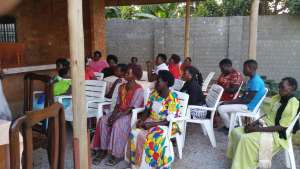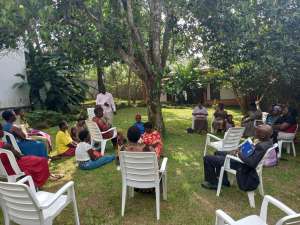[vc_row][vc_column icons_position=”left”][vc_column_text css_animation=”zoomIn”]
Nakoosi Women’s Empowerment and Savings Groups: What you Should Know?
 CETC is a non-profit company that aims to increase prosperity, create jobs and reduce poverty by bringing about a transformation for women from villages around the Eco-Tourism Centre. This group consisted of 120 women altogether. In addition, in the economies, they serve their local families. It provides expertise and capital to champion change whose ideas, influence and actions will make finance more useful to women’s businesses and households. It is not funded or with no Aid now, that is why CETC is advocating for donors that can help to empower these women in the communities around CETC. Donors can come from any country around the world. Through access to finance initiatives, it seeks to build financial inclusion for the local women around the facility. Through capital market development, it looks to promote economic growth and increase investment among the locals and their households. As a community program, it seeks to encourage collaboration among women, knowledge transfer and market-building activities – especially in farming. CETC also provides support to the Women Empowerment Network.
CETC is a non-profit company that aims to increase prosperity, create jobs and reduce poverty by bringing about a transformation for women from villages around the Eco-Tourism Centre. This group consisted of 120 women altogether. In addition, in the economies, they serve their local families. It provides expertise and capital to champion change whose ideas, influence and actions will make finance more useful to women’s businesses and households. It is not funded or with no Aid now, that is why CETC is advocating for donors that can help to empower these women in the communities around CETC. Donors can come from any country around the world. Through access to finance initiatives, it seeks to build financial inclusion for the local women around the facility. Through capital market development, it looks to promote economic growth and increase investment among the locals and their households. As a community program, it seeks to encourage collaboration among women, knowledge transfer and market-building activities – especially in farming. CETC also provides support to the Women Empowerment Network.
Empowerment outcomes for the women Savings Group
 Across Savings Group programming, there is demonstrable evidence of strong changes in economic independence, confidence and self-worth. Gains in decision-making and leadership are also observed to some extent, though data is somewhat limited. In projects that integrate gender, or implement specific gender interventions, positive change is evident across all empowerment domains. These findings reflect two important factors: not only do gender transformative projects specifically address barriers to empowerment, but they also have measurement frameworks dedicated to capturing these changes.
Across Savings Group programming, there is demonstrable evidence of strong changes in economic independence, confidence and self-worth. Gains in decision-making and leadership are also observed to some extent, though data is somewhat limited. In projects that integrate gender, or implement specific gender interventions, positive change is evident across all empowerment domains. These findings reflect two important factors: not only do gender transformative projects specifically address barriers to empowerment, but they also have measurement frameworks dedicated to capturing these changes.
 There is consistent evidence of improved access to financial resources by women in our Savings Group. Women also report increased participation in income-generating activities, access to productive resources, productivity and livelihood diversification. Production roles, however, are still largely gendered according to local norms. And there is limited evidence regarding the sustainability of new female-led enterprises around the CETC. Ownership of assets also remains contentious: groups surveyed in Nakoosi, Namuyenje, and Mukono district report that men can typically sell household assets without consultation, but women are expected to consult with the whole household before the sale of the same assets.
There is consistent evidence of improved access to financial resources by women in our Savings Group. Women also report increased participation in income-generating activities, access to productive resources, productivity and livelihood diversification. Production roles, however, are still largely gendered according to local norms. And there is limited evidence regarding the sustainability of new female-led enterprises around the CETC. Ownership of assets also remains contentious: groups surveyed in Nakoosi, Namuyenje, and Mukono district report that men can typically sell household assets without consultation, but women are expected to consult with the whole household before the sale of the same assets.
 Women report an increase in confidence and self-worth across the Savings Group program around the CETC communities. In some cases, this is directly attributed to being part of a group that stimulates participation and provides a safe space for sharing opinions. In addition, when members are approached by the community for advice on different issues, it builds their self-worth, providing positive affirmation of their achievements. Members report that the community changed their attitudes towards women in Savings Groups after observing the financial performance of the group, which suggests that confidence and self-worth are correlated with control over financial resources.
Women report an increase in confidence and self-worth across the Savings Group program around the CETC communities. In some cases, this is directly attributed to being part of a group that stimulates participation and provides a safe space for sharing opinions. In addition, when members are approached by the community for advice on different issues, it builds their self-worth, providing positive affirmation of their achievements. Members report that the community changed their attitudes towards women in Savings Groups after observing the financial performance of the group, which suggests that confidence and self-worth are correlated with control over financial resources.
 While program evaluations routinely report increased influence in household financial decision-making, the finding is highly nuanced. In focus group discussions, women recognize a change since joining our Savings Group: previously their engagement in household financial decision-making was limited, whereas now they are consulted about setting savings and investment goals because they are recognized for their money management skills. However, women’s role in decision-making regarding the sale of household and business assets remains limited, and purchases of higher-value items remain male-dominated. Decision-making around non-financial issues is not as consistently measured, but dedicated interventions to engage men report changes favouring women’s participation.
While program evaluations routinely report increased influence in household financial decision-making, the finding is highly nuanced. In focus group discussions, women recognize a change since joining our Savings Group: previously their engagement in household financial decision-making was limited, whereas now they are consulted about setting savings and investment goals because they are recognized for their money management skills. However, women’s role in decision-making regarding the sale of household and business assets remains limited, and purchases of higher-value items remain male-dominated. Decision-making around non-financial issues is not as consistently measured, but dedicated interventions to engage men report changes favouring women’s participation.
 In most cases, modest changes are observed in voice and leadership, whereby women are able to take up leadership positions within the group at CETC. In some cases, women also take up positions within local authority structures in Nakoosi, Namuyenje sub-county. However, these tend to be limited by social norms to traditional female roles such as secretaries. Greater changes occur – towards steering household affairs and expressing opinions publicly – when interventions engage men and local powerholders to transform mindsets towards women as leaders. Women also indicate the importance of female role models.
In most cases, modest changes are observed in voice and leadership, whereby women are able to take up leadership positions within the group at CETC. In some cases, women also take up positions within local authority structures in Nakoosi, Namuyenje sub-county. However, these tend to be limited by social norms to traditional female roles such as secretaries. Greater changes occur – towards steering household affairs and expressing opinions publicly – when interventions engage men and local powerholders to transform mindsets towards women as leaders. Women also indicate the importance of female role models.
[/vc_column_text][/vc_column][/vc_row]
